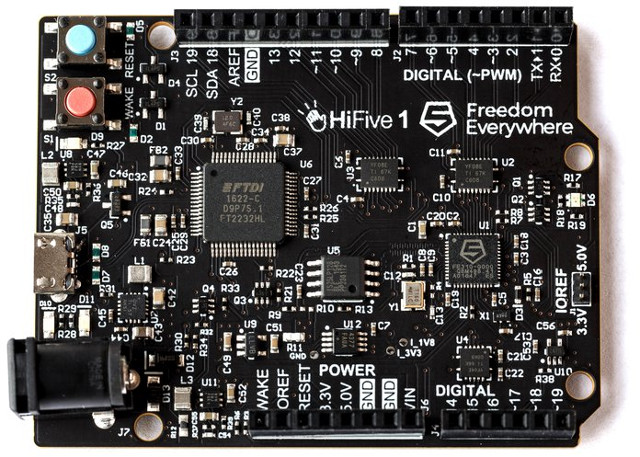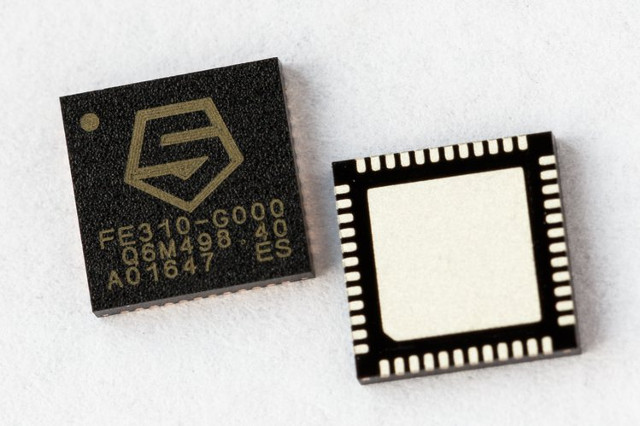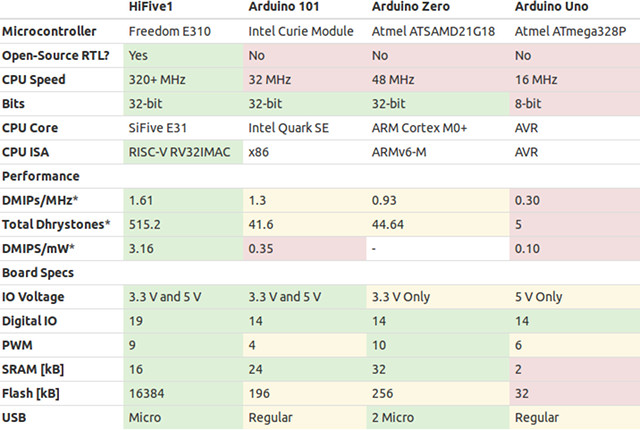Royalty-free RISC-V instruction sets has been getting in the news in the last few years with various MMU designs from companies or projects like lowRISC, PULPino, and SiFive, and recently there are been rumors that Samsung may use RISC-V in their future IoT SoCs. Many projects are still in progress, and while you can get involved in OnChip Open-V MCU crowdfunding campaign to their get the MCU or a development board, the cost for the MCU ($49) and development board ($99) is a little on the high side, and delivery is expected in 2018 for most rewards. SiFive appears to have a more interesting open source RISC-V solution with HiFive1 Arduino compatible board going for $59 and slated to ship between December 2016 and February 2017.

HiFive1 development board specifications:
- MCU – SiFive Freedom E310 (FE310) 32-bit RV32IMAC processor @ up to 320+ MHz (1.61 DMIPS/MHz)
- Storage – 128 Mbit SPI flash
- I/Os
- 19x Digital I/O Pins
- 19x external interrupt pins
- 1x external wakeup pin
- 9x PWM pins
- 1/3 SPI Controllers/HW CS Pins
- I/O Voltages – 3.3V or 5V supported
- USB – 1x micro USB port for power, programming and debugging
- Power Supply – 5 V via USB or 7 to 12V via DC Jack; Operating Voltage: 3.3 V and 1.8 V
- Dimensions – 68 mm x 51 mm
- Weight – 22 g
The company’s Freedom SDK with the RTL files for Freedom E310 (and U500) MCUs will allow you to actually play and/or modify the MCU on an FPGA platform, which can be useful for education or if you want to create your own MCU based on SiFive design. If you don’t have the know-how the company’s “chips-as-a-service” offering can customize FE310/U500 MCU to meet your needs.
Most users will probably just program the board with the Arduino IDE, and many of the usual development tools have already been ported to RISC-V architecture. The processor is also quite faster than our typical Arduino, being about 10 times faster than Intel Curie and Atmel SAMD21G18 used in respectively Arduino 101 and Arduino Zero.
Power efficiency (@ 200 MHz) appears to be much higher compared to Atmel AVR and Intel Quark. However, based on ARM Cortex M0 product brief (I could not find data for M0+), 10DMIPS/mW can be achieved using 180ULL process, and 75 DMIPS/mW with 65LP process.
If you are interested, you can get the board on Crowdsupply with the HiFive1 devkit going for $59 and shipping in February 2017, but if you want to have a piece of history, you may consider HiFive1 Founder Edition for $79 with SiFive Founding Team’s Signature on the silkscreen and shipping at the end of December 2016. Shipping is free to the US, and $15 to the rest of the world.
RISC-V could be a serious competitor to ARM and MIPS in the MCU/IoT space in the years ahead, as it’s royalty-free, and the RISC-V foundation has many players including some heavy weights such as Google, AMD, Microsemi, Qualcomm, Nvidia and more…
Thanks to noone for the tip.

Jean-Luc started CNX Software in 2010 as a part-time endeavor, before quitting his job as a software engineering manager, and starting to write daily news, and reviews full time later in 2011.
Support CNX Software! Donate via cryptocurrencies, become a Patron on Patreon, or purchase goods on Amazon or Aliexpress







considering FPGA cost ,Looks like very costly , with FPGA literately you could mimic any architecture ..
@varghese
It’s not quite as cheap as Arduino AVR / ARM clone yet, but cost may go down in the future.
HiFive1 board does not come with an FPGA at all, it’s a RISC-V MCU. It’s just the open sourceness of RISC-V gives you the option to emulate the RISC-V MCU on *another* FPGA platform.
It’s also a good way to learn more about RISC-V which may become popular in the future.
Very nice! But now please something Freedom U500-based — for us, software developers. Thanks! 🙂
@kcg
Think of U3xx as a fast microcontroller. U5xx – that’s another pricepoint.
WTF? This mcu will be significantly constrained by the small amount of SRAM!!
This chip only has a cache for code!? It’s only going to run at its stated max speed if the entire program is running out of cache. Instruction fetch via spi is not going to run anywhere 320 MHz
@Occam
It has 16KB I$ and 16KB scratchpad sram. It’s all in the specs.
I think 32KB is not enough for its 320MHz processor.